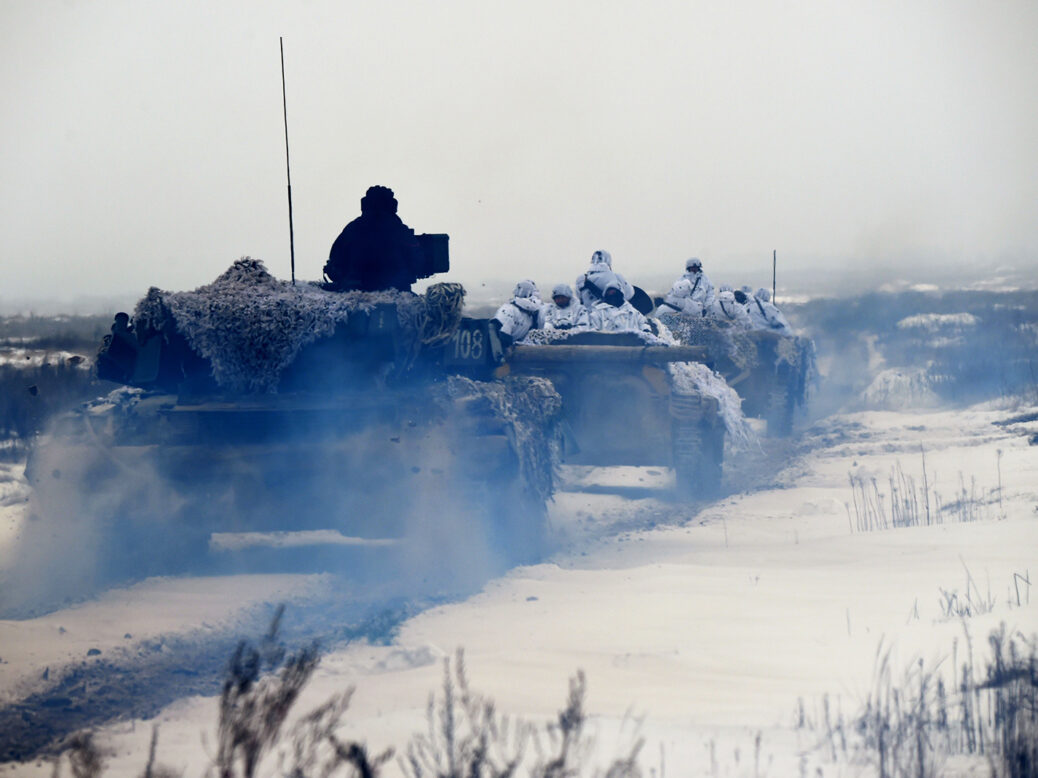
BERLIN – Georgia 2008, Ukraine 2022? The contours of what a Russian attack on Ukraine might look like are becoming clearer.
First, a sustained war of conquest is unlikely. The costs to Russia would be too high, the benefits too limited. Imprecise language used to describe the tensions that have been building at the border – the prospect of a “Russian invasion of Ukraine” – has not helped. An “invasion” evokes the conquest of more Ukrainian territory, beyond the parts Moscow admits to occupying (Crimea, annexed to Russia in 2014) and those it doesn’t (the regions of eastern Ukraine under the control of Russian-backed separatists). Yet capturing much more territory and holding on to it permanently will probably not be the central objective of a renewed Russian assault.
Instead, a quick, long-distance offensive intended to degrade Ukraine’s military capabilities and cause political chaos in Kyiv is more probable. The active phase of the 2008 Russo-Georgian War lasted only five days. Then, Russia’s military tactics involved a massive offensive that quickly overwhelmed Georgian forces. Some major population centres in undisputed Georgian territory were captured but were transferred back to Tbilisi’s control after a few months of occupation.
[See also: What would Russia risk to invade Ukraine?]
That is why overexcited talk of an insurgency turning Ukraine into a “new Afghanistan” for Russia probably misses the mark (the reference is to the USSR’s quagmire in the 1980s). “Russia has watched the US’s wars in Iraq and Afghanistan and has no interest in occupying terrain where the local populace would be hostile,” wrote Rob Lee, a military analyst at King’s College London.
A long-distance offensive to “teach the Ukrainians a lesson”, as the former White House advisor Fiona Hill puts it, might involve air strikes and artillery attacks, which Ukrainian forces would have limited capacity to defend against. If such attacks were followed by a ground invasion, troops would probably steer clear of large urban areas, where they would be more vulnerable to guerrilla warfare and which would be harder to capture. In extremis, the Russian army might push as far as Kyiv, encircling the capital but probably not entering it.
A limited offensive would have several advantages for Russia. It would avoid the mass casualties a wholesale invasion would entail, limiting domestic political fallout. Moreover, the diplomatic cost of a relatively restrained escalation would be less. That would mean countries that are less enthusiastic about the prospects of fresh sanctions on Russia, along the lines of those the US has said it will impose in such a scenario, may find it easier to argue for lighter measures.
Friedrich Merz, the new leader of Germany’s opposition Christian Democratic Union, has already warned that American proposals to cut Russia off from Swift, the international banking network, would do “a lot of harm” to Western economies. Russia has leverage over Europe because of this winter’s global natural gas shortage. Europe, which imports about 45 per cent of its gas from Russia, would suffer were Moscow to turn off the taps, meaning many EU countries may be reluctant to match the far-reaching sanctions Washington has promised.
Still, any escalation will not be cost-free for Russia. It would cause the deaths of Russian servicemen. Though the Russian economy is relatively sanction-proof, it would still be hit hard by measures the US has promised to impose if Russia invades. A significant fall in living standards would increase dissatisfaction with the Putin regime. Popular unrest in Kazakhstan earlier this month, initially prompted by a rise in fuel prices, will have illustrated to the Kremlin how brittle apparent stability under authoritarianism can really be. Putin may still decide that outright war is not worth it.
A Russian offensive might be followed by diplomatic moves echoing the aftermath of the 2008 war with Georgia. Moscow might officially recognise the governments of the breakaway People’s Republics of Lugansk and Donetsk, as it did to Abkhazia and South Ossetia, the two disputed regions of Georgia. Other options might include their full integration into the Russian Federation, following the annexation of Crimea eight years ago.
[See also: Is Vladimir Putin preparing for war?]
Alternatively, Moscow could decide to maintain the constitutional status quo on its side: the Kremlin using military victory against Ukraine to pressure Kyiv to implement a federal constitution for the country, including a veto for the eastern regions on national foreign policy, which would preclude eventual Ukrainian membership of Nato – a key Russian bugbear.
No one knows whether Russia plans to escalate. But one thing is almost certain: Putin has likely invested too much in this build-up of tensions to back down without receiving something in return. Having largely failed to convince the US and Nato to grant him the new European security architecture he demanded at talks last week, Putin will need to save face somehow.
[See also: With Russian forces on Ukraine’s borders, can transatlantic allies hang together?]





